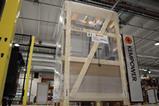E.ON and MAN Truck & Bus have announced a partnership to establish a public charging network for electric trucks across Europe. The initiative will include approximately 400 charging points at 170 locations, primarily within Germany but also extending to Austria, the UK, Denmark, Italy, Poland, the Czech Republic, and Hungary. This network aims to support the transition to sustainable logistics and green supply chains.

“Europe has set itself the goal of reducing emissions from heavy commercial vehicles by 90% by 2040. Electric mobility is a central key to achieving this goal,” said Leonhard Birnbaum, CEO of E.ON.
“We are investing heavily to give the infrastructure for electric heavy goods transport a decisive boost and to set the course for sustainable logistics and green supply chains. Nearly all major manufacturers are now focusing their development efforts on electric mobility. For the final breakthrough, we need a high-performance charging infrastructure that is designed on a European scale. We are delighted to be leading the way together with MAN,” he added.
To ensure the mobility transition succeeds, Europe needs 50,000 charging points for heavy commercial vehicles by 2030. MAN CEO Alexander Vlaskamp said the company is delighted to be partnering with E.ON to ”electrify its service locations” but stressed that ”we still urgently need the support of policymakers to build this network on a large scale”.
The new charging sites will be strategically located at MAN service bases, primarily in industrial areas with high truck traffic or near motorways. These locations will be designed for ease of use, featuring drive-through facilities to accommodate trucks and buses without requiring complex maneuvers. The charging stations will be accessible to all makes of commercial vehicles and will offer amenities such as sanitary facilities and recreation rooms.
Initially, each site will be equipped with several 400 kW charging stations, allowing an average electric truck to recharge for a range of up to 300 kilometres in about 45 minutes. Future upgrades will include the MCS megawatt charging system to support even longer ranges.
The first 80 sites are expected to be operational by the end of 2025. Sukhjinder Singh, CEO of E.ON subsidiary E.ON Drive Infrastructure, described the partnership as a significant milestone for sustainable heavy-duty transport, while Friedrich Baumann, Executive Board Member for Sales and Customer Solutions at MAN Truck & Bus, added that the success of electric trucks depends on the availability of a robust charging infrastructure.
Political goals for decarbonising transport in Germany and Europe include a 55% reduction in greenhouse gas emissions from heavy goods traffic in Germany by 2030 and climate neutrality by 2045. The EU aims to reduce co2 emissions from heavy-duty vehicles by 65% by 2035, and 90% by 2040, compared to 2019 levels. These goals underscore the need for substantial investments in vehicles and infrastructure.
MAN is accelerating its electrification efforts, with its first production-ready electric truck, capable of a daily range of up to 800 kilometres, set to launch in 2024. The company also plans to introduce an electric city bus with an extended range and a test fleet of electric coaches by 2025. E.ON, as a full-service provider for electromobility, already offers access to over 500,000 car charging points across Europe and provides customised charging solutions for companies and municipalities.


















